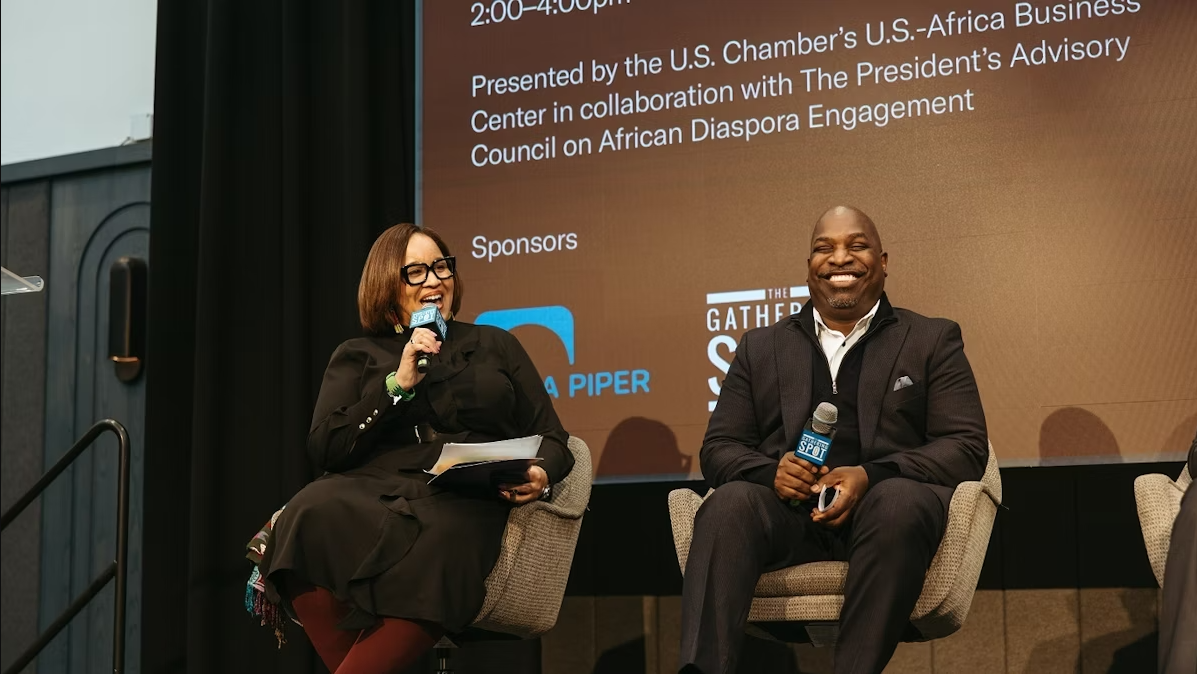
Our Projects are
Transforming African Trade
Quick Contacts
2nd Floor, Fidelity Insurance Centre Waiyaki Way, Westlands

The United States and the nations of Africa enjoy a vibrant, multifaced relationship focused on expanding partnerships, global cooperation, and shared prosperity. These countries also share another powerful bond: people. In the 2020 Census, more than 14.4% of Americans self-reported tracing their heritage to the African continent, and these cultural and familial ties provide a source of strength in building bridges through business.
Most small businesses do not export, but when they do, they tend to export to markets closest to them. The reasons to encourage small business owners, who make up 99% of all U.S. entrepreneurs, to consider new markets lie in a staggering statistic: 96% of the world’s consumers live outside the United States. Yet only one percent of all U.S. companies export, and when they do, these exporters are overwhelmingly small businesses, and nearly half of these firms sent the bulk of their goods to Canada, Mexico, the United Kingdom, and Japan in 2019. That makes the African diaspora a powerful force for building bridges and expanding our economic partnership with the fast-growing countries across Africa.
The U.S.-Africa Business Center’s mission to expand U.S.-Africa trade and investment led to the launch of Advance with Africa, with its goal of encouraging more U.S. companies—particularly diaspora-led ventures—to play a role in increasing commercial flows, educating them about doing business in Africa and equipping them with the tools to do so.
Recognizing the vital cultural, socio-economic, and commercial ties connecting the United States and Africa through the diaspora, the U.S. government announced the President’s Advisory Council on African Diaspora Engagement (PAC-ADE) during the 2022 U.S.-Africa Leaders Summit. The twelve-member council is comprised of leaders in government, civil society, philanthropy, and business. All have deep expertise working with African partners, including an executive of the U.S.-Africa Business Center Chair company PepsiCo.
Given the shared focus of the President’s Advisory Council and the U.S. Chamber on building bridges through business between the U.S. and Africa, the Chamber welcomed a partnership to convene entrepreneurs at The Gathering Spot in Atlanta under the “Advance with Africa” banner during the Council’s first-ever public meeting. Atlanta is an ideal location for engaging the diaspora in an African business dialogue. The city is a leader in U.S. small business growth, has a thriving black entrepreneur community, and its Hartsfield-Jackson International Airport—the world’s busiest—is one of a few in the U.S. with several direct flights to African destinations.
Home to a growing, youthful population, rapidly expanding purchasing power, and 11 of the 20 fastest-growing countries in 2024, Africa drives innovation through mobile money, sets global trends in music, film, and fashion, leads the world in green energy, and supplies the critical minerals powering the next generation of electric vehicles and technology. Through the African Union, an African continental free trade area was launched to erase barriers to intra-African trade while also consolidating the continent’s estimated 1.3 billion people into a common market.
Despite the many ways Africa is transforming the world, Africa accounted for less than two percent of the U.S. total trade in goods in 2022. U.S. companies seeking to engage with the continent could also benefit from advice and services from companies like our Atlanta event sponsor, DLA Piper, and the U.S. government initiative Prosper Africa. Diaspora business leaders bring a connection to their work with Africa that is about more than business transactions. As Rahama Wright, founder of Shea Yeleen, told the Atlanta business community, “It’s about how we build businesses … and how we can sustain economic impact in a meaningful way.”
The Center’s work in advancing commercial partnerships is enriched by diaspora business leaders, several of whom serve on our Board and guide the Chamber’s Africa priorities. The U.S.-Africa Business Center’s Vice Chair is GB Agboola, CEO and Founder of Flutterwave, a San Francisco and Lagos-based unicorn that simplifies digital payments, both allowing U.S. businesses active in Africa, like Uber, to easily collect payment from African customers, and supporting remittances transfers from the U.S. to African countries through their Send App. Naana Frimpong, a self-described bridge builder between the U.S. and Africa, is a Partner and Co-Chair of the US/Africa Practice for DLA Piper, which is operating in 20 African countries with the vision of supporting clients in the U.S. and Africa with their investment needs to take advantage of the enormous breadth of opportunity made possible through purposeful engagement.
The level of knowledge, cultural understanding, and personal connections that diaspora leaders use to inform our work at the Chamber was well understood by the African Union when it designated the global African diaspora the sixth region of Africa. That same consideration also guides the PAC-ADE as they fulfill their mandate, including providing advice to the President on trade, investment, and development in Africa. For the nearly 50 million Americans who claim African heritage and the small business leaders across the United States who seek new markets and partners for growth, the Chamber’s Advance with Africa will soon be headed to a city near you.
Read original article
Disclaimer: The views and opinions expressed in this article are those of the authors and do not necessarily reflect the official policy or position of TradeMark Africa.